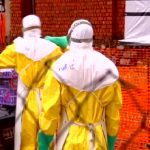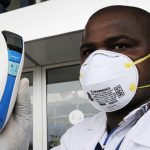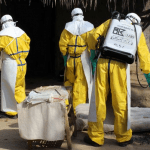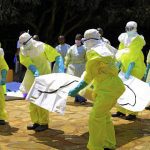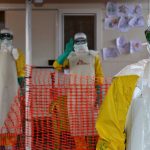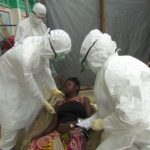Health authorities in Kinshasa declared the Ebola virus under control five weeks after the latest outbreak left 89 people dead in eastern Democratic Republic of Congo.
The health ministry announced the outbreak on August 1 in North Kivu province and on Thursday revealed that it had spread to Butembo, a city of a million people.
But Health Minister Dr Oly Ilunga Kalenga said: “Since August 13, there have been practically no more cases, we can say that the situation has been brought under control at the epicentre (of Mabalako).”
The latest outbreak of the virus is 10th to strike DRC since 1976, when the disease was first identified and named after a river in the country’s north.
“To date, we have 129 cases (31 probable and 98 confirmed), 89 deaths and 33 patients cured,” Dr Oly Ilunga said.
Fears that the disease might spread further had been expressed on Thursday after news of two deaths in Butembo, a commercial hub and popular transit point for neighbouring Uganda.
A woman and one of the medical staff who had been treating her died ini the city.
“Even at Butembo, the situation is not critical,” the minister told a news conference also attended by Congolese professor and leading Ebola researcher Professor Jean-Jacques Muyembe, who urged people to report any sign of the disease.
“The Ebola virus is circulating here and in Africa in general … we must be vigilant,” Muyembe said.
Complicating the battle against the spread of the disease is the fact it is afflicting an area of DRC wracked by insecurity owing to the presence of armed groups.
Even so, Dr Oly Ilunga said teams treating sufferers had enjoyed army and police backing as well as support from the UN mission Monusco.
The previous outbreak of Ebola, which left 33 people dead in the northwestern province of Equateur, was decreed over on July 24.
Health authorities in Kinshasa declared the Ebola virus under control five weeks after the latest outbreak left 89 people dead in eastern Democratic Republic of Congo.
The health ministry announced the outbreak on August 1 in North Kivu province and on Thursday revealed that it had spread to Butembo, a city of a million people.
But Health Minister Dr Oly Ilunga Kalenga said: “Since August 13, there have been practically no more cases, we can say that the situation has been brought under control at the epicentre (of Mabalako).”
The latest outbreak of the virus is 10th to strike DRC since 1976, when the disease was first identified and named after a river in the country’s north.
“To date, we have 129 cases (31 probable and 98 confirmed), 89 deaths and 33 patients cured,” Dr Oly Ilunga said.
Fears that the disease might spread further had been expressed on Thursday after news of two deaths in Butembo, a commercial hub and popular transit point for neighbouring Uganda.
A woman and one of the medical staff who had been treating her died ini the city.
“Even at Butembo, the situation is not critical,” the minister told a news conference also attended by Congolese professor and leading Ebola researcher Professor Jean-Jacques Muyembe, who urged people to report any sign of the disease.
“The Ebola virus is circulating here and in Africa in general … we must be vigilant,” Muyembe said.
Complicating the battle against the spread of the disease is the fact it is afflicting an area of DRC wracked by insecurity owing to the presence of armed groups.
Even so, Dr Oly Ilunga said teams treating sufferers had enjoyed army and police backing as well as support from the UN mission Monusco.
The previous outbreak of Ebola, which left 33 people dead in the northwestern province of Equateur, was decreed over on July 24.
Health authorities in Kinshasa declared the Ebola virus under control five weeks after the latest outbreak left 89 people dead in eastern Democratic Republic of Congo.
The health ministry announced the outbreak on August 1 in North Kivu province and on Thursday revealed that it had spread to Butembo, a city of a million people.
But Health Minister Dr Oly Ilunga Kalenga said: “Since August 13, there have been practically no more cases, we can say that the situation has been brought under control at the epicentre (of Mabalako).”
The latest outbreak of the virus is 10th to strike DRC since 1976, when the disease was first identified and named after a river in the country’s north.
“To date, we have 129 cases (31 probable and 98 confirmed), 89 deaths and 33 patients cured,” Dr Oly Ilunga said.
Fears that the disease might spread further had been expressed on Thursday after news of two deaths in Butembo, a commercial hub and popular transit point for neighbouring Uganda.
A woman and one of the medical staff who had been treating her died ini the city.
“Even at Butembo, the situation is not critical,” the minister told a news conference also attended by Congolese professor and leading Ebola researcher Professor Jean-Jacques Muyembe, who urged people to report any sign of the disease.
“The Ebola virus is circulating here and in Africa in general … we must be vigilant,” Muyembe said.
Complicating the battle against the spread of the disease is the fact it is afflicting an area of DRC wracked by insecurity owing to the presence of armed groups.
Even so, Dr Oly Ilunga said teams treating sufferers had enjoyed army and police backing as well as support from the UN mission Monusco.
The previous outbreak of Ebola, which left 33 people dead in the northwestern province of Equateur, was decreed over on July 24.
Health authorities in Kinshasa declared the Ebola virus under control five weeks after the latest outbreak left 89 people dead in eastern Democratic Republic of Congo.
The health ministry announced the outbreak on August 1 in North Kivu province and on Thursday revealed that it had spread to Butembo, a city of a million people.
But Health Minister Dr Oly Ilunga Kalenga said: “Since August 13, there have been practically no more cases, we can say that the situation has been brought under control at the epicentre (of Mabalako).”
The latest outbreak of the virus is 10th to strike DRC since 1976, when the disease was first identified and named after a river in the country’s north.
“To date, we have 129 cases (31 probable and 98 confirmed), 89 deaths and 33 patients cured,” Dr Oly Ilunga said.
Fears that the disease might spread further had been expressed on Thursday after news of two deaths in Butembo, a commercial hub and popular transit point for neighbouring Uganda.
A woman and one of the medical staff who had been treating her died ini the city.
“Even at Butembo, the situation is not critical,” the minister told a news conference also attended by Congolese professor and leading Ebola researcher Professor Jean-Jacques Muyembe, who urged people to report any sign of the disease.
“The Ebola virus is circulating here and in Africa in general … we must be vigilant,” Muyembe said.
Complicating the battle against the spread of the disease is the fact it is afflicting an area of DRC wracked by insecurity owing to the presence of armed groups.
Even so, Dr Oly Ilunga said teams treating sufferers had enjoyed army and police backing as well as support from the UN mission Monusco.
The previous outbreak of Ebola, which left 33 people dead in the northwestern province of Equateur, was decreed over on July 24.
Health authorities in Kinshasa declared the Ebola virus under control five weeks after the latest outbreak left 89 people dead in eastern Democratic Republic of Congo.
The health ministry announced the outbreak on August 1 in North Kivu province and on Thursday revealed that it had spread to Butembo, a city of a million people.
But Health Minister Dr Oly Ilunga Kalenga said: “Since August 13, there have been practically no more cases, we can say that the situation has been brought under control at the epicentre (of Mabalako).”
The latest outbreak of the virus is 10th to strike DRC since 1976, when the disease was first identified and named after a river in the country’s north.
“To date, we have 129 cases (31 probable and 98 confirmed), 89 deaths and 33 patients cured,” Dr Oly Ilunga said.
Fears that the disease might spread further had been expressed on Thursday after news of two deaths in Butembo, a commercial hub and popular transit point for neighbouring Uganda.
A woman and one of the medical staff who had been treating her died ini the city.
“Even at Butembo, the situation is not critical,” the minister told a news conference also attended by Congolese professor and leading Ebola researcher Professor Jean-Jacques Muyembe, who urged people to report any sign of the disease.
“The Ebola virus is circulating here and in Africa in general … we must be vigilant,” Muyembe said.
Complicating the battle against the spread of the disease is the fact it is afflicting an area of DRC wracked by insecurity owing to the presence of armed groups.
Even so, Dr Oly Ilunga said teams treating sufferers had enjoyed army and police backing as well as support from the UN mission Monusco.
The previous outbreak of Ebola, which left 33 people dead in the northwestern province of Equateur, was decreed over on July 24.
Health authorities in Kinshasa declared the Ebola virus under control five weeks after the latest outbreak left 89 people dead in eastern Democratic Republic of Congo.
The health ministry announced the outbreak on August 1 in North Kivu province and on Thursday revealed that it had spread to Butembo, a city of a million people.
But Health Minister Dr Oly Ilunga Kalenga said: “Since August 13, there have been practically no more cases, we can say that the situation has been brought under control at the epicentre (of Mabalako).”
The latest outbreak of the virus is 10th to strike DRC since 1976, when the disease was first identified and named after a river in the country’s north.
“To date, we have 129 cases (31 probable and 98 confirmed), 89 deaths and 33 patients cured,” Dr Oly Ilunga said.
Fears that the disease might spread further had been expressed on Thursday after news of two deaths in Butembo, a commercial hub and popular transit point for neighbouring Uganda.
A woman and one of the medical staff who had been treating her died ini the city.
“Even at Butembo, the situation is not critical,” the minister told a news conference also attended by Congolese professor and leading Ebola researcher Professor Jean-Jacques Muyembe, who urged people to report any sign of the disease.
“The Ebola virus is circulating here and in Africa in general … we must be vigilant,” Muyembe said.
Complicating the battle against the spread of the disease is the fact it is afflicting an area of DRC wracked by insecurity owing to the presence of armed groups.
Even so, Dr Oly Ilunga said teams treating sufferers had enjoyed army and police backing as well as support from the UN mission Monusco.
The previous outbreak of Ebola, which left 33 people dead in the northwestern province of Equateur, was decreed over on July 24.
Health authorities in Kinshasa declared the Ebola virus under control five weeks after the latest outbreak left 89 people dead in eastern Democratic Republic of Congo.
The health ministry announced the outbreak on August 1 in North Kivu province and on Thursday revealed that it had spread to Butembo, a city of a million people.
But Health Minister Dr Oly Ilunga Kalenga said: “Since August 13, there have been practically no more cases, we can say that the situation has been brought under control at the epicentre (of Mabalako).”
The latest outbreak of the virus is 10th to strike DRC since 1976, when the disease was first identified and named after a river in the country’s north.
“To date, we have 129 cases (31 probable and 98 confirmed), 89 deaths and 33 patients cured,” Dr Oly Ilunga said.
Fears that the disease might spread further had been expressed on Thursday after news of two deaths in Butembo, a commercial hub and popular transit point for neighbouring Uganda.
A woman and one of the medical staff who had been treating her died ini the city.
“Even at Butembo, the situation is not critical,” the minister told a news conference also attended by Congolese professor and leading Ebola researcher Professor Jean-Jacques Muyembe, who urged people to report any sign of the disease.
“The Ebola virus is circulating here and in Africa in general … we must be vigilant,” Muyembe said.
Complicating the battle against the spread of the disease is the fact it is afflicting an area of DRC wracked by insecurity owing to the presence of armed groups.
Even so, Dr Oly Ilunga said teams treating sufferers had enjoyed army and police backing as well as support from the UN mission Monusco.
The previous outbreak of Ebola, which left 33 people dead in the northwestern province of Equateur, was decreed over on July 24.
Health authorities in Kinshasa declared the Ebola virus under control five weeks after the latest outbreak left 89 people dead in eastern Democratic Republic of Congo.
The health ministry announced the outbreak on August 1 in North Kivu province and on Thursday revealed that it had spread to Butembo, a city of a million people.
But Health Minister Dr Oly Ilunga Kalenga said: “Since August 13, there have been practically no more cases, we can say that the situation has been brought under control at the epicentre (of Mabalako).”
The latest outbreak of the virus is 10th to strike DRC since 1976, when the disease was first identified and named after a river in the country’s north.
“To date, we have 129 cases (31 probable and 98 confirmed), 89 deaths and 33 patients cured,” Dr Oly Ilunga said.
Fears that the disease might spread further had been expressed on Thursday after news of two deaths in Butembo, a commercial hub and popular transit point for neighbouring Uganda.
A woman and one of the medical staff who had been treating her died ini the city.
“Even at Butembo, the situation is not critical,” the minister told a news conference also attended by Congolese professor and leading Ebola researcher Professor Jean-Jacques Muyembe, who urged people to report any sign of the disease.
“The Ebola virus is circulating here and in Africa in general … we must be vigilant,” Muyembe said.
Complicating the battle against the spread of the disease is the fact it is afflicting an area of DRC wracked by insecurity owing to the presence of armed groups.
Even so, Dr Oly Ilunga said teams treating sufferers had enjoyed army and police backing as well as support from the UN mission Monusco.
The previous outbreak of Ebola, which left 33 people dead in the northwestern province of Equateur, was decreed over on July 24.




